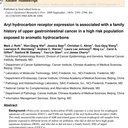Swahili
Albanian
Arabic
Armenian
Azerbaijani
Belarusian
Bengali
Bosnian
Catalan
Czech
Danish
Deutsch
Dutch
English
Estonian
Finnish
Français
Greek
Haitian Creole
Hebrew
Hindi
Hungarian
Icelandic
Indonesian
Irish
Italian
Japanese
Korean
Latvian
Lithuanian
Macedonian
Mongolian
Norwegian
Persian
Polish
Portuguese
Romanian
Russian
Serbian
Slovak
Slovenian
Spanish
Swahili
Swedish
Turkish
Ukrainian
Vietnamese
Български
中文(简体)
中文(繁體)
Molecular genetics & genomic medicine 2019-Oct
Watumiaji waliosajiliwa tu ndio wanaweza kutafsiri nakala
Ingia / Ingia
Kiungo kimehifadhiwa kwenye clipboard
Hifadhidata kamili ya mimea ya dawa inayoungwa mkono na sayansi
- Inafanya kazi katika lugha 55
- Uponyaji wa mitishamba unaungwa mkono na sayansi
- Kutambua mimea kwa picha
- Ramani ya GPS inayoshirikiana
- Soma machapisho ya kisayansi yanayohusiana na utafutaji wako
- Tafuta mimea ya dawa na athari zao
- Panga maslahi yako na fanya tarehe ya utafiti wa habari, majaribio ya kliniki na ruhusu
Andika dalili au ugonjwa na usome juu ya mimea ambayo inaweza kusaidia, chapa mimea na uone magonjwa na dalili ambazo hutumiwa dhidi yake.
* Habari zote zinategemea utafiti wa kisayansi uliochapishwa




